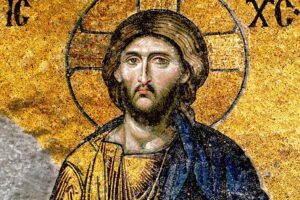Last edited on 25/Jan/2021
The Bible’s Answer
Introduction
You should believe in the Holy Trinity because by believing in it you will avoid fundamental theological errors and heresies which you will undoubtedly adopt if you reject the doctrine of the Trinity. By believing in the Trinity you will also worship God for who he truly is and believe how he has truly revealed himself in and to his creation. Most importantly, you should believe in it because the Bible teaches it in many passages and it is an essential biblical doctrine.
Definition of the Trinity
The Trinity is the biblical, monotheistic doctrine that there is only one God in all existence who exists in three different Persons of the same essence: the Father, Son (who is Jesus), and Holy Spirit. To be a person means to have the qualities of personhood, for example: having speech, love, a will, thoughts, actions, etc. A person is a rational being with a centre of consciousness.¹ The Father, Son, and Holy Spirit are three distinct Persons in the sense that God is one being who has three centres of consciousness.
An essence refers to “something that exists”; “the inward nature, true substance, or constitution of anything,” according to Dictionary.com.² The simplest definition for an essence is that an essence is a being. Theopedia gives a great definition for the word “being”:
Being is the quality or state of having existence. Specifically this is the gerund form of the verb to be which functions as a substantive (noun). As a noun, being may refer to either a thing or a substance. The latter is really our concern. A being in this sense is something that is generally living, or if not living, then conscious (certain substances may be conscious, but not living in an embodied state, and some substances may be living—plants, for example—but not conscious). A substance is the owner and unifier of properties, parts, and capacities. A being remains absolutely the same through law-like, repeatable change to reach a final stage if change is part of its nature. Each being or substance has a nature or secondary substance to it. For example, John Doe is a particular being with a human nature. ‘Oneness in nature’ does not entail ‘oneness in being’. John, Joe, and Jack are one in their nature (i.e., they are all human), but they are not one in their being (i.e., they are all separate human beings). The members of the Trinity are not only one in the former sense, they are one in the latter sense (i.e., they are all inseparably united as one being). ¹
The Father, Son, and Holy Spirit are equally, fully, and simultaneously God, and have been forever.
Consequences of Rejecting the Trinity
Rejecting the Trinity is not simply rejecting a “church teaching made in a council”, as some falsely believe, but it in fact requires that one rejects a host of biblical doctrines, all of which according to the Bible are essential doctrines. By rejecting the Trinity one must reject at least one of the crucial Bible teachings below:
- Jesus’ eternal pre-existence (in contradiction to John 1:1, where the imperfective aspect of the verb “was” is used, which implies a continuous, unending state of existence, and Micah 5:2).
- Jesus’ role as the uncreated creator of all things in existence (in contradiction to Colossians 1:16 and Hebrews 1:10) and that God created all things alone, by himself (in contradiction to Isaiah 44:24).
- Jesus’ omnipotence, omniscience, and omnipresence (in contradiction to Philippians 3:20–21, John 16:30, and Matthew 28:20).
- Jesus’ deity (in contradiction to John 20:28, Romans 10:9–13, which applies Joel 2:32, a passage concerning God, to Christ, and Colossians 2:9).
- That Jesus is the unique Son of the Father from eternity (in contradiction to John 1:14, John 3:16, and Romans 8:14–15, the last of which teaches that Christians only become children of God by adoption).
- Jesus’ sinless nature (in contradiction to 1 Peter 2:21–22) and the fact that only God is perfectly holy (in contradiction to Isaiah 8:13 and 1 Peter 3:15, which applies this Old Testament scripture concerning God to Christ).
- That Jesus did not need to earn his salvation (in contradiction to John 8:28–29, where Jesus said he always did the things that are pleasing to the Father and that the Father never left him alone, 1 Peter 1:18–19, where Jesus’ blood is precious and he was the unblemished sacrifice for the sins of the world, and Romans 5:18–21, where it says that Jesus’ obedience and righteousness was perfect).
- That Jesus has the exact same nature as God (in contradiction to Hebrews 1:3).
- That Jesus is equal with God (in contradiction to Philippians 2:5–6 and John 5:18).
- That Jesus is prayed to and worshipped (in contradiction to Acts 7:59–60, when Stephen prayed to Jesus to receive his spirit, and Matthew 14:33).
- That Jesus and the Holy Spirit are not two separate Gods from the Father (in contradiction to Isaiah 43:10 and Isaiah 45:5).
- The Holy Spirit’s personhood (in contradiction to Acts 8:29, Romans 15:30, 1 Corinthians 12:11, and Ephesians 4:30, which teach that the Spirit can talk, love, grieve, and has a will).
- The Holy Spirit’s omnipotence, omniscience, and omnipresence (in contradiction to Luke 1:35, 1 Corinthians 2:10–11, and Psalm 139:7–8).
- The Holy Spirit’s deity (in contradiction to Hebrews 10:15–18 which applies Jeremiah 31:33, a passage where God talks, to the Holy Spirit, and 2 Corinthians 3:17).
- The Holy Spirit’s unique roles which stand out from the Father’s and the Son’s roles (in contradiction to 2 Thessalonians 2:13, where the Spirit’s primary role is sanctification, Romans 8:1–11, where the Spirit sets us free from the law, and makes it possible to live by it, and Titus 3:4–7, where the Father’s, the Son’s, and the Holy Spirit’s works are each described separately in the same passage).
- That the Holy Spirit is alive (in contradiction to Romans 8:2 and Romans 8:11).
- That the Holy Spirit is not the Father, the Father is not the Son, and the Son is not the Holy Spirit (in contradiction to Luke 3:21–22, and Matthew 28:19).
- That the Holy Spirit is eternal (in contradiction to Hebrews 9:14).
- That God’s temple is a habitation for deity and not an impersonal force (in contradiction to 1 Corinthians 3:16–17, which teaches the deity of the Spirit because he dwells in God’s holy temple).³
- That the Holy Spirit was the creator of all things in the very beginning (in contradiction to Genesis 1:1–2; Job 33:4).
As you can see, the doctrine of the Holy Trinity is firmly rooted in the Bible, which is the inerrant Word of God, and by rejecting it, one will reject some or even most of the very important biblical doctrines above. Rejecting the Trinity is not simply rejecting a church teaching invented by a council hundreds of years after the first apostles and disciples of Jesus, and such thinking has led many people to denying the Bible’s teachings, and thus the true Christian faith. We must judge the Trinity’s truthfulness based on if it agrees with the Bible or not, not on what others (such as religions, groups, organisations, or teachers) tell us about it, or on our own personal opinions of it. As shown, the Trinity is in fact in agreement with the teachings of the Bible.
Biblical Evidence for the Trinity and Examining the Three Other Views of God
If one rejects the Trinity, they must believe in one of three other views of God. The first is Tritheism, the view that the Father, Son, and Holy Spirit are three different Gods. The second is Unitarianism or Monarchism, the view that the Father alone is God, but not the Son, or the Holy Spirit. The third is Modalism, the view that the Father, the Son, and the Holy Spirit are the same Person, instead of being one God in three separate Persons.
Because the Bible teaches that there is only one God in all existence (Isaiah 43:10; Isaiah 44:6–8; 1 Corinthians 8:4–6), this means that Tritheism, the view of the Trinity being three separate Gods, is false. Because the Bible calls Jesus God (John 1:1, 14; John 20:28–29; Revelation 1:17–18) and the Holy Spirit God (Acts 5:3–4; 1 Corinthians 3:16; 2 Corinthians 3:17), this means that Unitarianism or Monarchism, the view that the Father is God while Jesus and the Holy Spirit are not, is false. And because the Bible makes clear distinctions between the Father, Son, and Holy Spirit as three individual Persons (Matthew 3:16–17; John 14:16–17; 2 Corinthians 13:14), this means that Modalism, the view that the Father, Son, and Holy Spirit are the one Person, is false.
Although the word “Trinity” is not mentioned in the Bible, we see that the Bible clearly teaches it. And as shown, out of all the beliefs that deal with the person and essence of God, only the doctrine of the Trinity stands true to the Bible’s teachings as a whole, while all the others fall short in various ways.
Did Christians Invent the Trinity in the Council of Nicaea?
Some say that there is no evidence to suggest that the early Christians believed in the Trinity and that it was only until 325 AD after the Council of Nicaea that it was believed in. This is also false because the Bible teaches it, as already shown, and therefore the authors of the Bible believed in it and would have taught it to the early Christians. However, there is also evidence outside of the Bible to suggest that it was believed. The following is a quote by Melito of Sardis, who died in 180 AD, which is more than 100 years before the Council of Nicaea:
He that hung up the earth in space was Himself hanged up; He that fixed the heavens was fixed with nails; He that bore up the earth was born up on a tree; the Lord of all was subjected to ignominy in a naked body – God put to death! . . . [I]n order that He might not be seen, the luminaries turned away, and the day became darkened—because they slew God, who hung naked on the tree. . . . This is He who made the heaven and the earth, and in the beginning, together with the Father, fashioned man; who was announced by means of the law and the prophets; who put on a bodily form in the Virgin; who was hanged upon the tree; who was buried in the earth; who rose from the place of the dead, and ascended to the height of heaven, and sitteth on the right hand of the Father. (Melito, 5. ANF, VIII:757) ⁴,⁵
This next quote is from Tertullian, who lived between 160–215 AD, which is also more than 100 years before the Council of Nicaea:
We define that there are two, the Father and the Son, and three with the Holy Spirit, and this number is made by the pattern of salvation . . . [which] brings about unity in trinity, interrelating the three, the Father, the Son, and the Holy Spirit. They are three, not in dignity, but in degree, not in substance but in form, not in power but in kind. They are of one substance and power, because there is one God from whom these degrees, forms and kinds devolve in the name of Father, Son and Holy Spirit. (Adv. Prax. 23; PL 2.156–7) ⁶
All that the Council of Nicaea in 325 AD did was provide Christians with a concise and easier way of putting the mystery of God into words to tell others about it and confess it for themselves, to help them stay unified in the faith. It was also done in response to attacks against Jesus and the Holy Spirit, and to help Christians defend their already firmly held beliefs.
Conclusion
The main reasons why people reject the doctrine of the Trinity is because they find it difficult to understand, and because the term to describe its teaching was first officially coined in 325 AD. However, as has been shown, these are not valid reasons for rejecting it. Not everything is easy to understand about God, such as his eternal nature, but that doesn’t mean that he isn’t eternal. Terms of particular biblical teachings may not be found in the Bible and invented later, such as monotheism, biblical inerrancy, or Sacrament, but that doesn’t mean that these aren’t taught in the Bible.
For those of you who are earnestly studying the Trinity to see if it is a biblical teaching: keep on praying, studying the Bible, and researching it. The Christian journey involves growing in the grace and knowledge of Jesus Christ (2 Peter 3:18). It also involves moving on from drinking spiritual milk, to eating spiritual solid food, which can only be done through maturity in the faith and training in the Word of righteousness (Hebrews 5:12–14). As you continue doing this, you will continue learning more about God and become closer to him. If you continue studying the doctrine of the Trinity and reading the Bible you will one day come to believe in the Trinity, because it is the only teaching about God which is in harmony with every passage of Scripture and which can stand against all criticism.
The grace of the Lord Jesus Christ and the love of God and the fellowship of the Holy Spirit be with you all. (2 Corinthians 13:14)
Reference List
1. Theopedia, Being, accessed on 19 April 2017, <https://www.theopedia.com/being>
2. Dictionary.com, Essence, accessed on 19 April 2017, <http://www.dictionary.com/browse/essence>
3. Morrison M, Grace Communion International, The Deity of the Holy Spirit, accessed on 19 April 2017, <https://www.gci.org/God/deityHS>
4. Friel T, Wretched, Debunked: Dan Brown’s claim that Jesus is not God., viewed on 19 April 2017, <https://www.youtube.com/watch?v=r0wiHHiMDcY>
5. Samson J, Effectual Grace, The Deity of Christ (in the Early Church), accessed on 19 April 2017, <http://effectualgrace.com/2015/04/02/the-deity-of-christ-in-the-early-church/>
6. Slick M, Christian Apologetics and Research Ministry, Early Trinitarian Quotes, accessed on 19 April 2017, <https://carm.org/early-trinitarian-quotes>





